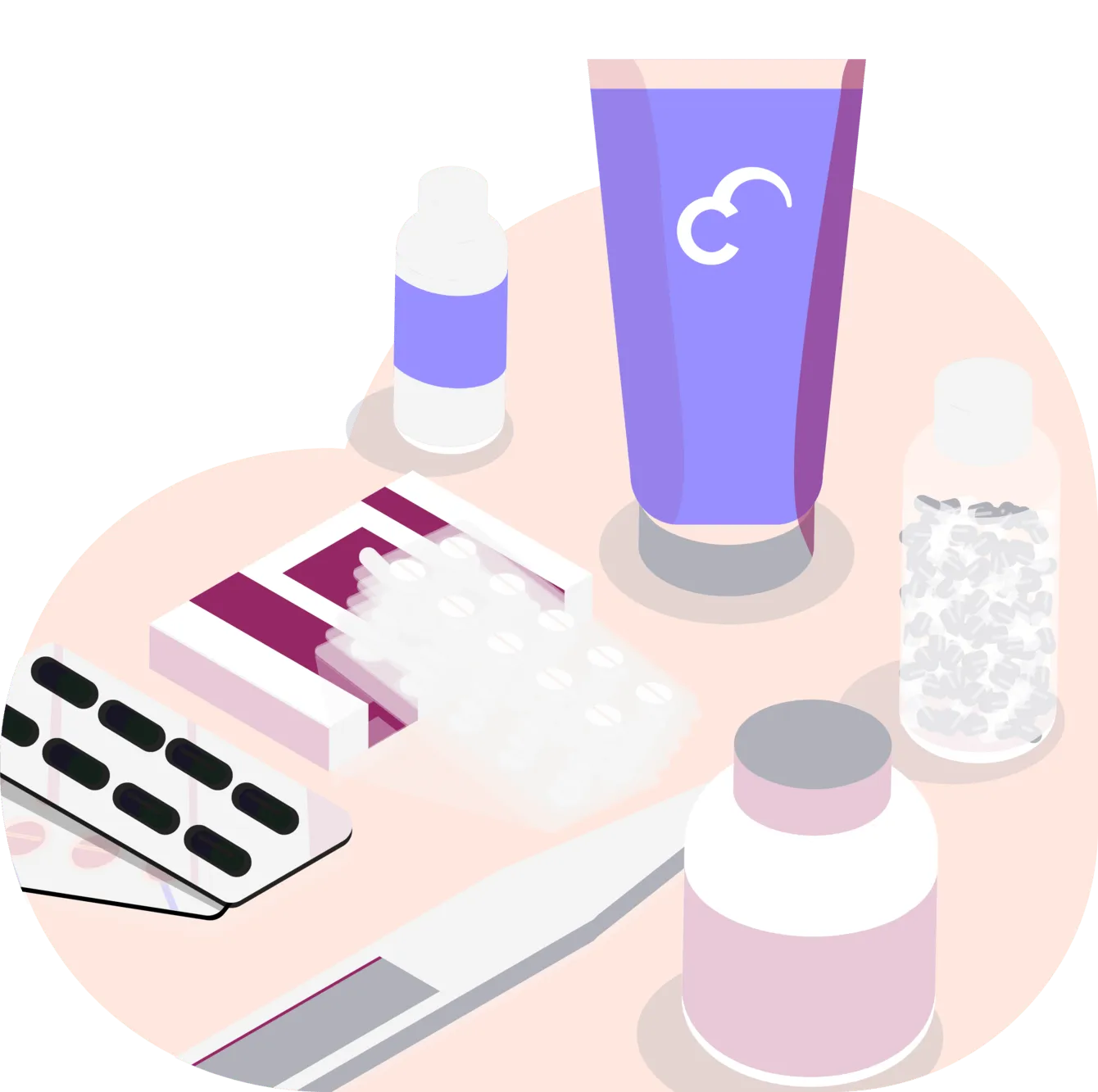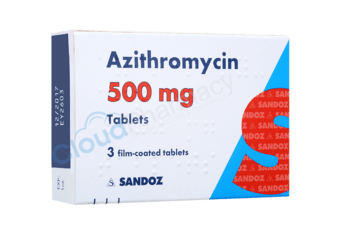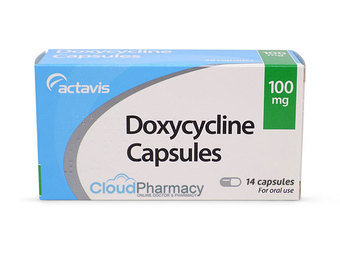Chlamydia

More information
Introduction
Order Antibiotics for Chlamydia Online
Chlamydia is a bacterial infection that is transmitted through genital fluid during unprotected vaginal, oral, or anal sex. It is one of the most common sexually transmitted infections (STIs) in the UK. If left untreated, it can cause more serious conditions, such as pelvic inflammatory disease (PID) in women, and infertility in men and women.
You can order chlamydia treatment online from our UK registered prescribing service.
For more information on Chlamydia please visit the NHS guide here.
Treatments
More information
Once an online consultation has been been approved by our medical team, our pharmacy will safely prepare and ship your treatment to you in discreet packaging using Royal Mail or DPD.
What Is Chlamydia?
Chlamydia is a common sexually transmitted bacterial infection. In fact, it is one of the most common sexually transmitted infections (STIs), affecting over 468,000 people in the UK in 2019.
Chlamydia is highly contagious as many people will not experience any symptoms. In fact, some people can go months without realising that they have chlamydia.
Symptoms rarely occur for many people who have the infection. It is important that if you are sexually active that you regularly get a chlamydia test. It is also recommended that you get tested at least once every year so you can catch the infection early if you do have it.
What Causes Chlamydia?
Chlamydia is typically passed on through unprotected sexual activity. Sex without using a condom and unprotected oral sex are the main ways that a chlamydia infection can be transmitted. However, penetration does not have to occur to contract it. Touching genitals together can transmit the bacteria.
Chlamydia can also be contacted if you have had the infection before and failed to treat it properly. So, it is crucial that you complete the chlamydia treatment cycle to ensure the infection has completely gone.
Newborn babies can contract chlamydia from their mothers during birth. Most prenatal testing includes a chlamydia test. However, it is worth checking in with your obstetrician-gynecologist before your first testing.
Symptoms of Chlamydia
Although 70% of men and 90% of women do not show any symptoms of chlamydia when they have the infection, there are still many symptoms that people can experience. Common symptoms include:
- Pain whilst urinating
- Unusual discharge from the genitals
If you do start to show signs of these symptoms, typically, they will start to show up within one to three weeks after contact. If you experience symptoms and are unsure if it is chlamydia or not, you should consult with your doctor as soon as possible.
Chlamydia Symptoms in Men
Although the causes of chlamydia for both men and women are the same, the symptoms can differ. Below are some of the most common symptoms that men can experience from contracting Chlamydia:
- Small amounts of clear or cloudy discharge from the tip of your penis
- Painful urination
- Burning and itching around the opening of your penis
- Pain and swelling around your testicles
For men, if Chlamydia is left untreated, it can spread to the testicles and epididymis. These are the tubes that carry sperm to the testicles. This can lead to inflamed testicles, which can affect your fertility.
Chlamydia Symptoms in Women
Unlike men, women have a greater risk of pelvic inflammatory disease (PID) if their infection goes untreated. This can cause the infection to spread to the womb, fallopian tubes, or ovaries, which can cause issues in relation to pregnancy and infertility. PID can be treated however and the sooner you can identify it, the better.
Below are some of the most common chlamydia symptoms for women:
- Abnormal vaginal discharge that may have an odour
- Bleeding between periods
- Painful periods
- Abdominal pain with fever
- Pain when you have sex
- Itching or burning in or around your vagina
- Pain when urinating
It is important to remember that not every woman will experience these symptoms and may potentially experience none of them. However, you should be aware of them so you can identify your infection sooner rather than later.
How Common Is Chlamydia?
Chlamydia is a very common STI, especially amongst people under the age of 25. It is estimated that 1 in 20 sexually active young women aged 14-24 years has chlamydia.
It is not difficult for the infection to spread once someone has contracted it. As previously mentioned, simply coming into contact with someone's genitals is enough to contract the virus. This is why it is important to regularly get tested.
The infection is also easily spread because most people do not experience any symptoms. They may continue to be sexually active with new sexual partners without knowing they are spreading the infection.
Chlamydia and Pregnancy
If your newborn baby does contract chlamydia, they may develop an eye infection (conjunctivitis) and lung infection (pneumonia). If your baby has any of these symptoms, your GP can arrange a chlamydia test for you.
If this is the case then antibiotics will be used to clear the infection. However, it is important to note that untreated chlamydia in pregnancy can also increase the risk of problems such as premature labour and low birth weight.
Does Chlamydia Go Away?
Chlamydia treatment is necessary in order for the infection to no longer be present. The infection can be easily treated, and the earlier you catch it, the fewer complications you will have in the future.
Just because symptoms may have subsided does not mean the infection is gone. Even with ease in symptoms, the infection may persist in the body. If you follow your chlamydia treatment correctly, the infection will go away.
Chlamydia can be caused by the incorrect use of treatment. Chlamydia will still be present in your body if you fail to clear up the infection properly. If you are unsure about whether your infection is gone, then it is advised that you speak to your GP or pharmacist.
Long Term Effects of Chlamydia
Although chlamydia can be easy to treat, there are some long-term effects that can occur as a result of the infection. In the absence of regular testing, your lack of symptoms and awareness of the infection can cause some long-term health issues.
Women have an increased risk of pelvic inflammatory disease and ectopic pregnancy. This is a pregnancy wherein the fertilised egg ends up implanted outside of the uterus.
Although it is rare, there have also been some cases where chlamydia has caused reactive arthritis. This condition causes inflammatory pain in the joints, particularly in your knees, ankles, and feet.
For men, although rare, there is an increased risk of epididymitis. This can cause a range of unpleasant symptoms such as:
- Swelling and redness in the scrotum
- Blood in semen
- Pain in the pelvis
Chlamydia Treatment
Chlamydia can usually be effectively treated with antibiotics. Over 95% of people are cured if they take their antibiotics correctly. There are two commonly prescribed antibiotics for chlamydia, doxycycline, and azithromycin.
Here at Cloud Pharmacy, we provide both doxycycline and azithromycin tablets that are available for you to order through our online pharmacy. Once a short online consultation has been completed and approved by one of our medical professionals, we will send the medication to you in an unmarked package.
Always remember to be vigilant when looking for antibiotics online and always opt for a UK-registered prescribing service like the one we offer.
FAQ
What is Chlamydia?
It is a sexually transmitted infection (STI) caused by Chlamydia Trachomatis which can affect men and women. It can be found in the genitals, anus, throat or eyes. It is spread through unprotected sex. Using a condom can reduce the risk of catching it.
How common is Chlamydia?
Chlamydia is the most commonly diagnosed sexually transmitted disease in the UK, with over 200,000 patients testing positive every year. Young people in the 15 - 24 age group are particularly at risk, which is why annual screening is recommended for anyone who is sexually active and under 25.
However, chlamydia affects people of all ages and a recent report by the Health Protection Agency showed that the number of people over 50 who are diagnosed with an STI like chlamydia has doubled in the past ten years.
If you have had unprotected sex with a partner who could have chlamydia you should get tested for chlamydia.
Can Chlamydia be Cured?
Chlamydia is treated with the antibiotic doxycycline. Chlamydia treatment kills the chlamydia bacteria and it is highly effective.
How long does Chlamydia take to cure?
It takes 1 full week of treatment to be effective. You should avoid any sexual contact both with or without a condom during your treatment time, as you could still be contagious.
If you are under the age of 25 a chlamydia test is recommended 3 months after you finish your treatment.
Is "The Clap" the same as Chlamydia?
No, although it is commonly thought that Chlamydia is 'The Clap', it is actually Gonorrhoea that 'The Clap' refers to. Gonorrhoea tests are also available from Cloud Pharmacy.
Does Chlamydia go away by itself?
Untreated Chlamydia won’t go away by itself and can do more harm to your body. If Chlamydia is left untreated in women, it can spread to the womb and causing pelvic inflammatory disease (PID). PID is a major cause of infertility, miscarriage and ectopic pregnancy.
If Chlamydia is left untreated in men they are at risk of complications of Chlamydia such as orchitis (swollen testicles), reactive arthritis, and infertility. Chlamydia treatment is easy and the infection is curable.
Cloud Pharmacy offers a discreet home test that includes the lab costs, the urine container and the pre-paid envelope. You will receive your results by text message, normally within 72 hours of sending off your sample.
How long does it take to show symptoms of Chlamydia?
Up to 50% of men and 70% of women do not show symptoms of the infection. It can take one to three weeks for the symptoms to develop, however they can occur months later. You can have no symptoms but still carry the infection and have the ability to infect others.
How long will it take for me to get a positive test if I have caught Chlamydia?
It can take up to 2 weeks for a positive Chlamydia test to show, therefore we recommend people wait at least 10 days from their unprotected sexual encounter before testing. This will help to prevent false readings in the test results and ensure you get an accurate diagnosis.
I have taken antibiotics for Chlamydia but my symptoms have not cleared
There are many reasons why you maybe experiencing persistent symptoms. These could include:
- You have another underlying sexually transmitted infection (STI) at the same time. This will need further investigations or tests. Gonorrhoea commonly occurs in conjunction with Chlamydia.
- You have an unrelated infection e.g. a lower urinary tract infection or endometriosis.
- On rare occasions the strain of bacteria can be resistant to the antibiotics and further treatment is required.
Another chlamydia test may be required but this will have to be performed after 6 weeks. Any earlier and the test will present a positive result from the initial infection.
In the case of failed treatment or unresolved symptoms you should see your GP or visit your local GUM clinic.
Do I have to tell my partner or previous sexual partners?
It is important you tell your current partner and other sexual partners within the last 6 months if you have been tested positive for chlamydia because:
- They may not know they have an infection and can spread it to others.
- If it is left untreated it can lead to serious complications such as infertility.
- Chlamydia treatment is easy, simple and the infection is curable.
We understand that this may be a difficult conversation, however it is very important you tell your previous sexual partners if you have been diagnosed with Chlamydia to allow them to be tested and treated.
How long after taking Chlamydia treatment does it take for symptoms to clear?
Chlamydia antibiotics, Azithromycin or Doxycycline, usually clear symptoms quickly. Pain on passing urine and discharge normally clear within a week, however pelvic or testicular pain can take two weeks to pass. Menstrual irregularities should improve by the next cycle. Any symptoms that persist may be an indicator of failed treatment, if this occurs you should see your doctor or local sexual health clinic for further treatment.
Is it best for both partners to get Chlamydia treatment at the same time?
Yes, it is important to treat both sexual partners for Chlamydia if they have had sex because one partner untreated or partially treated can re-infect the other. After treatment you need to abstain from sexual activity for one week. This includes genital, oral and anal sex even with a condom.
How do I use Doxycycline for Chlamydia?
Take one Doxycycline capsule in the morning and one capsule in the evening, roughly 12 hours apart. A full course to treat Chlamydia is seven days treatment, 14 capsules in total.
Doxycycline should be taken on an empty stomach whilst sitting upright or standing. We do not recommend you take the medication directly before going to bed as it may cause irritation of the oesophagus. Ensure you drink plenty of water with each dose. Unlike other antibiotics in the tetracycline family, taking it with food does not significantly affect the absorption. If you feel nauseous or experience an upset tummy then swallow the capsules with food.
What do I do if a sexual partner tells me they have Chlamydia?
You may wish to go ahead and get Chlamydia treatment without being tested if you have had unprotected sex with someone who has Chlamydia. You can also get a Chlamydia test to see if you have a positive result. If you do get a positive result, you will need to take antibiotic treatment to cure your Chlamydia infection, this is normally very straightforward.
If you have had sex with other partners since you were infected, you need to contact them to let them know that they should take a Chlamydia test and may require treatment.
Is it safe to buy Chlamydia treatment online?
Yes, as long as you are buying from a website that is a legally operating and regulated pharmacy it is perfectly safe to buy Chlamydia antibiotic treatment online.
Cloud Pharmacy is a registered pharmacy based in Scotland and has all the necessary regulation to be able to safely provide convenient access to genuine prescription antibiotics through our Online Pharmacy.
How do I buy antibiotics for Chlamydia online?
All you will need to fill in a simple health questionnaire so we can ensure that Chlamydia treatment will be safe and effective for you. It all takes less than 5 minutes and they can be delivered to your door.
Guides
How it works

First...
Complete a quick eligibility check

Then...
Order your treatment

Finally.
Fast, confidential delivery to your door


















